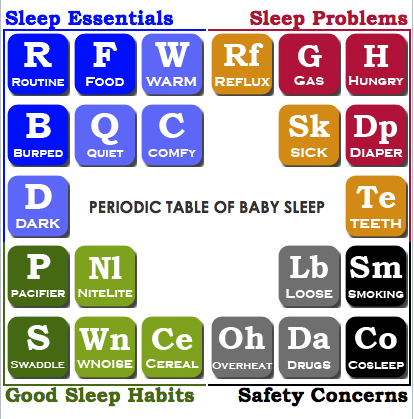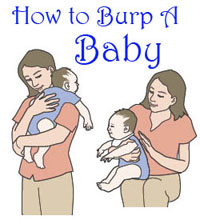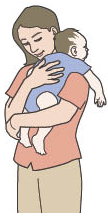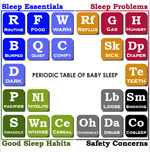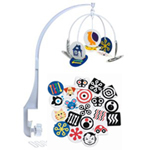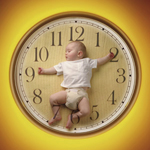We’ve created this clickable periodic table of baby sleep with all of the elements — sleep essentials, good habits, common sleep problems, and safety concerns — to help your baby get a good night’s sleep.
|
|||||||||||||||||||||||||||||||||||||||||||||||||
Essentials for Baby Sleep
These are the basic things that your baby needs to fall asleep. In dark blue are the basic necessities for putting baby to bed; in light blue are the things he’ll need to fall asleep quickly and consistently.
 |
Routine. Establishing a sleep schedule and nighttime routine for your baby is critical for good sleep habits. You’ve probably heard of bath-bottle-bed, a classic bedtime routine. Following the same steps at roughly the same time each night helps train your baby that it’s time to go to sleep. |
 |
Feeding. A full belly is one of the most important ingredients for success in baby sleep training. Simply put, the more food your baby has in his belly, the longer he’ll sleep. It’s all about the nighttime feeding. Solid foods, once your pediatrician OKs them, make a huge difference if you give them at the evening meal. |
 |
Burping. One of the most common reasons, if not the most common reason, that babies won’t go to sleep or wake up crying is from stomach gas. That’s why you have to burp a baby extensively before bed. Knowing some alternate burping techniques will help get stubborn burps out. |
 |
Quiet. This may seem rather obvious, but most infants sleep best in a quiet sleeping environment. White noise is fine, but random noises — from televisions, radios, siblings, or parents — will disrupt the rest and might wake your baby up for the night. Keeping things quiet can be especially difficult if you’re entertaining or traveling with your baby. Invest in a good baby sleep monitor to stay in tune with your baby overnight. |
 |
Comfort. This has two parts to it: choosing the right clothes and blanket(s) for your baby to sleep in, and comforting him at bedtime. You, as a caring parent who’s online reading about babies and sleep, probably do this last part pretty well. For help with the first, see What A Newborn Should Sleep In and check out our guide to cute baby pajamas. |
 |
Warmth. Being nice and warm helps a baby sleep just as much as it helps an adult. Babies have a harder job of it, though, because they’re so little. A velcro swaddler or baby sleep sack will help keep your baby warm and snug overnight. See also How to Swaddle A Newborn. |
 |
Dark. You can help your baby sleep through the night by promoting his natural circadian rhythms – make sure he gets light during the day when it’s play time, but goes to sleep in a dark or nearly-dark room, with at most a night light to see by. |
Good Habits to Help Baby Sleep Longer
There are numerous sleep strategies that parents use to help their babies sleep longer and more deeply. Not all of these will work for every baby, but these are some things I recommend when you’re trying to get your baby to sleep through the night.
 |
Pacifier. The pacifier is a must-have for bedtime. You should have two or three backups readily at hand so that you can find one in the dark in the middle of the night. Many parents use the hospital-preferred Soothie, though pacifiers by MAM seem more comfortable for older babies. See The Best Baby Pacifiers for more recommendations. |
 |
Swaddle. If you ever look through the window of a hospital nursery, you’ll notice that the nurses tend to swaddle a newborn under their care. Sometimes one-handed, too, which is impressive. Swaddling your baby mimics the warm snugness and comfort of the womb, while also providing a safe wrapping for your baby to sleep in. A baby sleep sack or sleeping bag does the same while allowing the legs some movement. |
 |
Night Light. This could be for your baby, to keep him entertained or distracted while he’s falling asleep in bed. More likely, though, it will be for the parents, to minimize the number of cracked knees and stubbed toes that inevitably result from bumbling around in the dark in baby’s room. See Choosing A Night Light for Baby for some recommendations. |
 |
White Noise. Something that provides a low, steady humming noise helps shield your baby from other noises that might wake it. Further, it forms part of the baby bedroom “environment” in which your baby becomes accustomed to sleeping. A fan is a good choice here, because it has the added benefit of circulating air around the room. Soothers and sound machines are also a comfort for many babies. |
 |
Cereal. As soon as your pediatrician approves it, get some single-grain cereal and start teaching your baby to eat it. Rice and oat cereals are good to start with. You can use cereal to thicken baby food (especially carrots, sweet potatoes, and most fruits). Give your baby cereal at the evening meal (or a bit with the bedtime bottle) and you’ll almost certainly notice him sleeping longer. |
Common Baby Sleep Problems
When your baby cries in bed, or wakes up in the middle of the night, there are dozens of possible explanations. In my experience, though, a handful of the most common reasons explain 90% of the times that a baby won’t sleep.
 |
Hunger. In my opinion, this is the single most common reason that babies (1) refuse to go to sleep, or (2) wake up crying in the middle of the night. They’re growing all the time. They need food to do it. A good nighttime feeding strategy will help keep your baby’s tummy full overnight. |
 |
Gassiness. Another major source of bedtime discomfort and baby waking up. Sometimes there’s not much you can do; infant digestive systems are still maturing and need some time to work the kinks out. Just be sure you know how to burp a baby thoroughly before bed, and be certain to do it every time. |
 |
Diaper. A fresh, clean diaper is a must when putting your baby to bed. Babies with a wet or dirty diapers usually won’t even go to sleep, much less stay there. When your infant is a little bit older (say 3 months), look into the Huggies Overnites diapers. These wick away more moisture to keep your baby dry overnight. See our article on the Importance of Diapers for Sleeping. |
 |
Reflux. Spitting up is a common problem with newborns, and especially frustrating around bedtime because (1) your baby messes up his pajamas, and (2) he’s just regurgitated the food he’ll need to sleep overnight. You can protect against this by keeping him upright (holding, bouncer, or Bumbo seat) for 20-30 minutes before bed. For more tips, see Handling Reflux or Colic. |
 |
Sick. Even the best-trained babies have trouble sleeping when they’re sick. They feel icky, they’re congested, they can’t breathe, and they cough the pacifier right out. Getting A Sick Baby to Sleep takes extra patience and extra work, but it can be done. |
 |
Teething. This is one of the reasons why baby won’t sleep that’s hard to diagnose. Sometimes your baby has a runny nose, or refuses to eat even though he seems hungry. My boys would suddenly wake up screaming, as if in pain. Luckily there’s a good solution for this problem: Baby Orajel. |
Unsafe Sleep Practices
All of us have bad habits. When it comes to babies and sleep, however, your weak points can actually create a dangerous situation for your baby. Some of the most worrisome safety concerns warned about by the American Academy of Pediatrics are in orange and red.
 |
Co-sleeping, or sleeping in the same room with your baby is actually a recommended practice to help you monitor him overnight. A mini crib is ideal for this. Bed-sharing (letting the baby sleep in your bed), however, can be dangerous. This is a major risk for SIDS and you shouldn’t get into the habit. See Cosleeping with Baby for some advice. And check out the safe crib for co-sleeping. |
 |
Smoking. Room-sharing and bed-sharing with someone who smokes increases a baby’s risk of SIDS, even if that person doesn’t smoke while in bed. The carcinogen-containing smoke particles cling to a smoker’s clothing, skin, and hair, and can still be transferred when he or she touches or goes near an infant. Quitting smoking is something you should try very hard to do. For you, and for baby. |
 |
Overheating. With all of the flannel pajamas, swaddlers, and baby blankets, it is quite possible for your baby to overheat. The AAP recommends that your baby have, at most, one more layer of clothing on than an adult would need to feel comfortable. Some of the digital video baby monitors that we reviewed include remote temperature sensors for the nursery, which seems like a nice idea. |
 |
Drugs and Alcohol. Parents taking prescription drugs, non-prescription drugs (you know what I mean), or alcohol can endanger their baby because these things make them (1) less responsive, (2) groggy and/or clumsy, and (3) poor in judgment. The risk of SIDS is even higher when parents also let the baby sleep in their bed. |
 |
Loose Bedding. This is the danger that we all know about, and all of us eventually become guilty of. When you’re trying to get a baby to sleep and comforting him, it’s tempting to put a little stuffed animal or soft pillow or loose blanket in his crib. Be strong, and don’t do it. Your baby’s crib should only have one thing in it: the baby. Consider swaddling with an Aden+Anais blanket for extra comfort. |
What To Read Next
If you like this article, you might want to subscribe by e-mail or RSS so that you’re notified when new content is posted.
